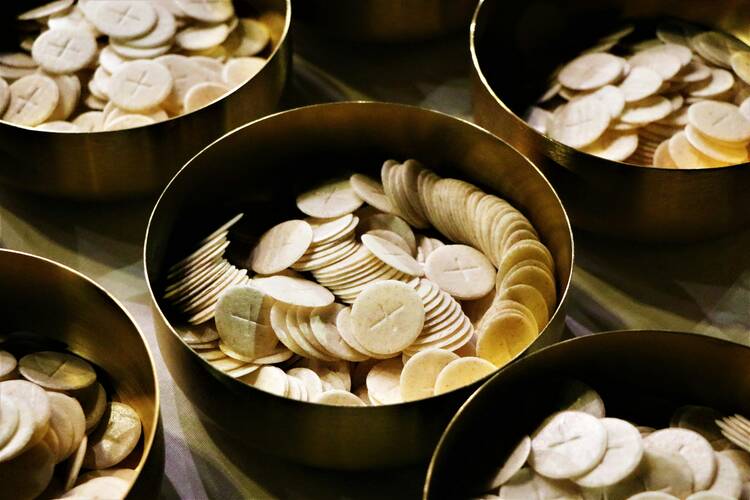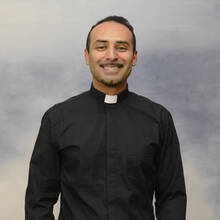Broken and Given: The Body of Christ as Real Presence
This Sunday’s readings call the faithful to reconsider the most holy body and blood of Christ in light of extreme divisions facing our country and world. This Sunday, the readings draw out three unique themes. These are the priesthood of Melchizedek, the “body” of Christ and the distribution of nourishment. Each of these reflections can help the faithful through moments of confusion and societal tensions.
“They all ate and were satisfied” (Lk 9:17).
How are you being broken by world events today?
Is there any way in your brokenness you might be given to those who hunger today?
Where do you find the Body of Christ calling out to you?
There are only two references in the Old Testament to Melchizedek, a mysterious “king of Salem.” Both references are included in this Sunday’s first reading and psalm. This ancient figure was described as a priest of “God Most High,” in Hebrew El Elyon, one of the oldest titles of Israel’s God and one drawn from even older traditions in the ancient Near East. Melchizedek the priest blessed Abram with prayer, bread and wine. Because of this exchange between Melchizedek and Abram through such basic elements (prayer, bread, wine), the church has long recognized eucharistic tones in this blessing. Using an adaptation of Melchizedek’s rite, every priest at every mass will offer a similar prayer over the offerings (Gn 14:19-20). This Sunday’s psalm highlights the role of Melchizedek as both priest and king. “Yours is princely power in the day of your birth, before the daystar, like the dew, I have begotten you” (Ps 110:3). Later Christian writers understood this ancient reference to be a foreshadowing of Christ, they priestly and royal messiah.
The Gospels and letters of Paul record a basic eucharistic formula. One such reference appears in this Sunday’ second reading: “The Lord Jesus, on the night he was handed over, took bread, and, after he had given thanks, broke it and said, ‘This is my body that is for you. Do this in remembrance of me’” (1 Cor 11:23-24). Paul speaks of Christ’s body in two ways. The physical body of Christ was broken and given to the world through his passion and resurrection. In the same way, the community of faith in every generation is meant to be broken and given for the world through participation of the one sacrifice of reconciliation. In the next chapter, Paul was clear about this, “Now you are the body of Christ, and each one of you is a part of it” (1 Cor 12:27). The church, according to Paul, was always meant to live in the tension of the world, to be broken for the sake of the reconciliation of all.
Finally, this Sunday’s Gospel depicts Jesus’ urgency to distribute food to the hungry crowd. In response to the risk-adverse thinking of his disciples who said, “Dismiss the crowd,” Jesus responds, “Give them some food yourselves” (Lk 9:12-13). All were satisfied, says the Gospel.
Is it possible to reach a place in society where all are satisfied with conditions of work, faith, education, hunger and freedom? Reading the news each morning, it seems that the answer is no. There is so little peace, and it is hard to feel confidence in our world leaders’ ability to distribute food and freedom. This Sunday’s biblical readings however demand that we nourish the hungry. Throughout all of Scripture, the “hungry” are the stranger in our midst, the orphan and widow. This Sunday’s readings also highlight the hesitation of his disciples to feed a vast crowd that remained outside of Jesus’ inner circle. In a practical compromise, the disciples believed that dismissing the hungry people was the best thing to do in the moment. Jesus, by contrast, remained focused on their needs and on God’s power: “Then taking the five loaves and the two fish, and looking up to heaven, he said the blessing over them, broke them, and gave them to the disciples to set before the crowd” (Lk 9:16).
May we be a eucharistic people broken and given to all who are hungry. When we give up the things we merely want so that others can have something, even crumbs or leftovers, that they desperately need, then all can be nourished by Christ’s love and real presence.








